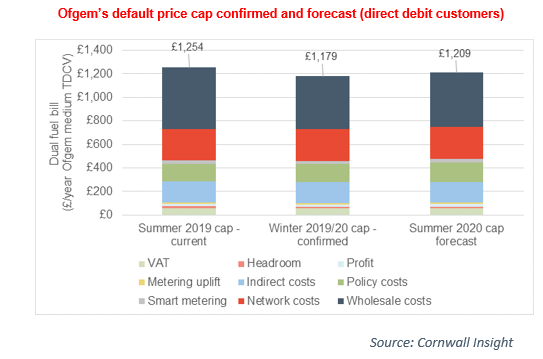Today, Ofgem announced the default price cap would decrease by £75 to £1,179 per year for the six months effective from 1 October 2019. However, this is unlikely to last with Cornwall Insight’s Price Cap Predictor showing the default price cap is set to increase by at least £30 for the summer 2020 period, assuming wholesale prices stay the same as on 31 July 2019 (graph below).

Robert Buckley, Head of Retail and Relationship Development at Cornwall Insight, said:
“This announcement by Ofgem to reduce the price cap comes as no surprise, due to the significant reduction in the wholesale market we have seen. For example, winter 19 gas was trading in the market at 60p/th on 31 January, while the same contract at the end of July was trading 15% lower at 51p/th.
“Currently, the gap between the most expensive deals – predominantly Standard Variable Tariffs (SVTs) – and the cheapest tariff is more than £250. While today’s announcement of the default price cap falling will narrow, a notable gap remains. As a result, today’s announcement should be used as a catalyst for customers to check their tariff to see if they are on the best possible deal.
“Despite the downward movement to the default price cap today, early forecasts for summer 2020 show it increasing once again unless wholesale prices fall sharply over winter. If wholesale prices remain as they were at 31 July 2019, higher policy and network costs will drive the default price cap higher and erase over a third of the decrease that will come into effect in October.”

Price Cap Predictor
The Price Cap Predictor forecasts Ofgem’s safeguard tariff and the government’s default tariff cap utilising tariff models and own forecasts of industry and other costs. The predictor looks two years ahead and is updated each time Ofgem sets a new level for the safeguard tariff or default tariff cap.

